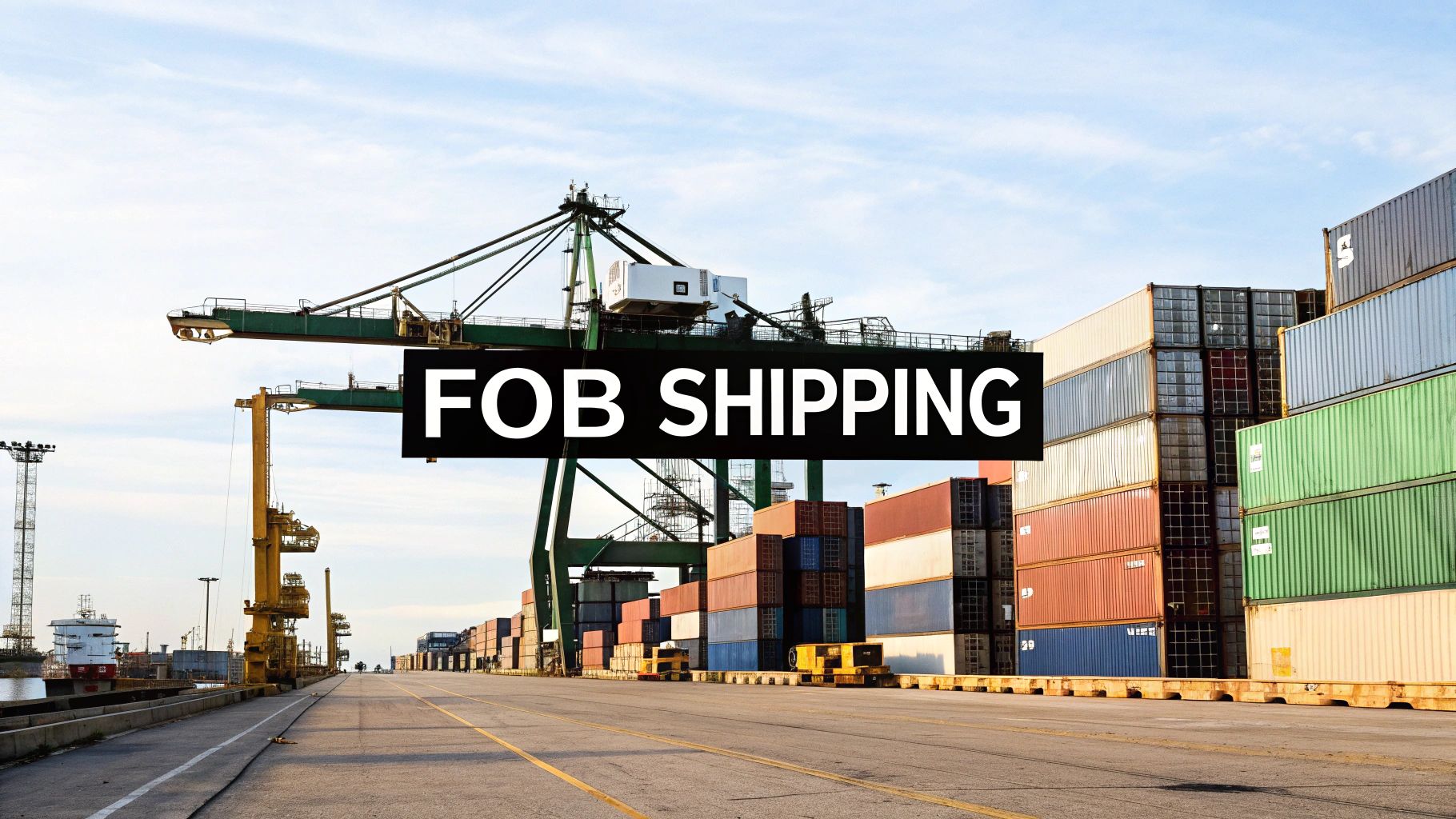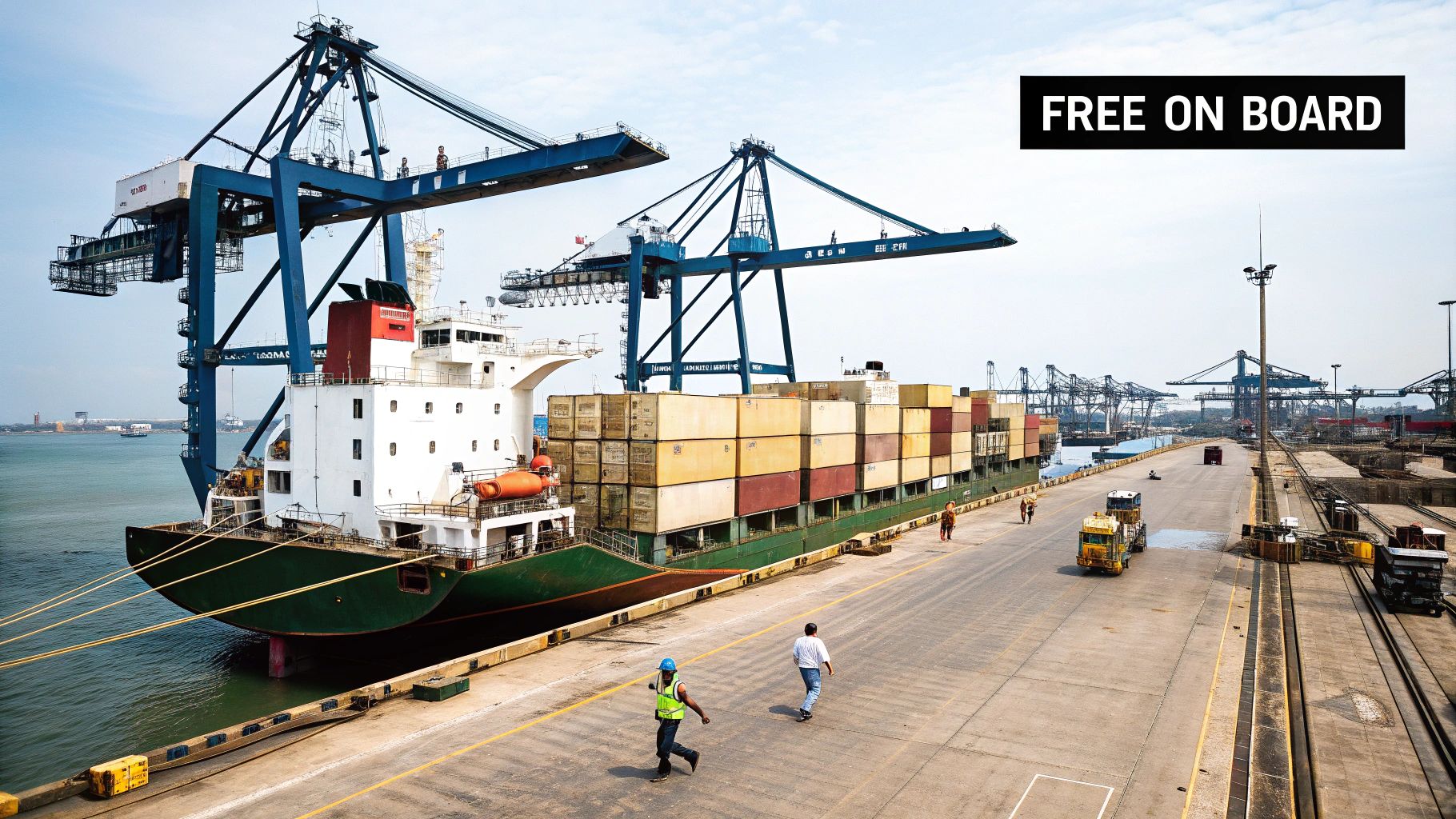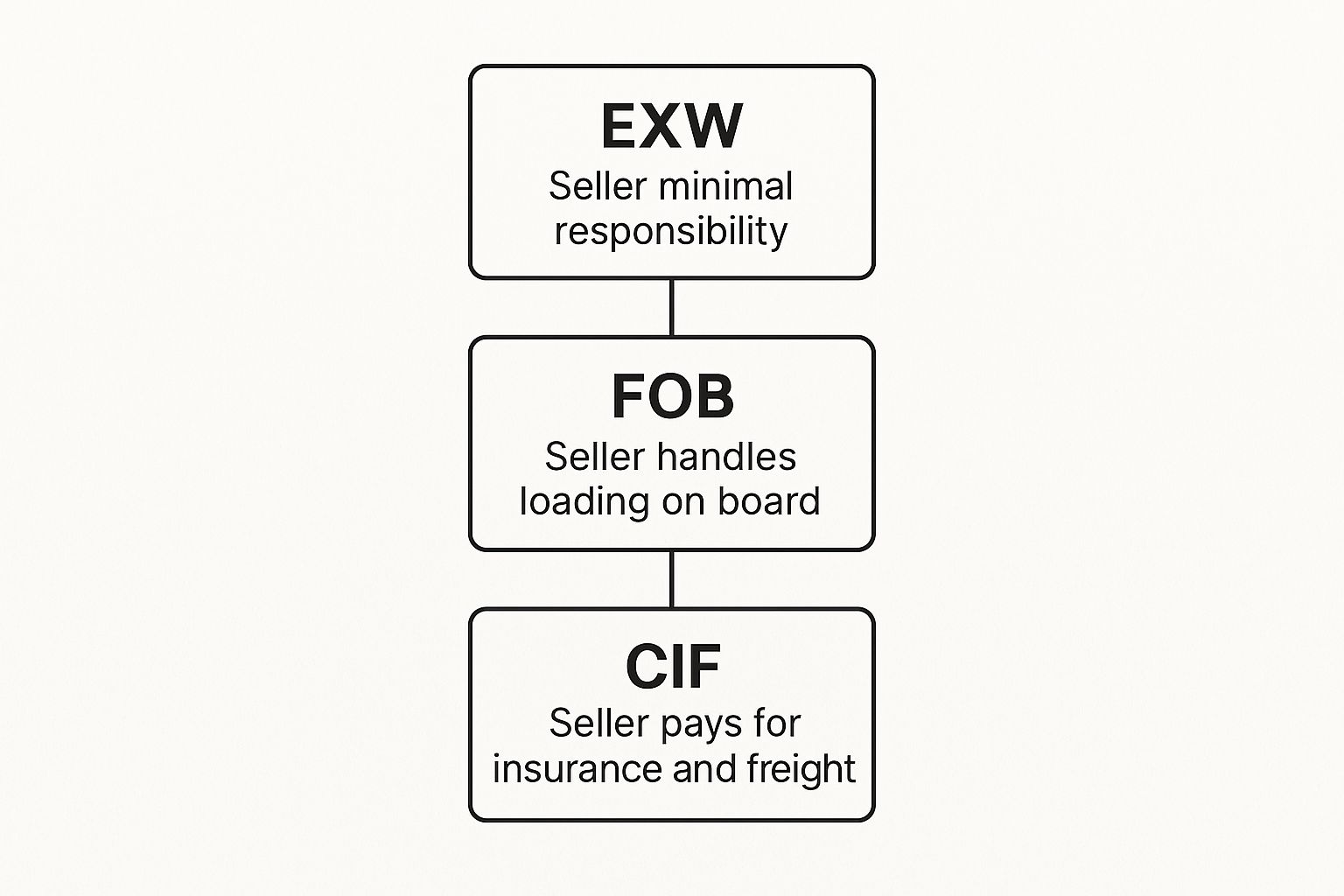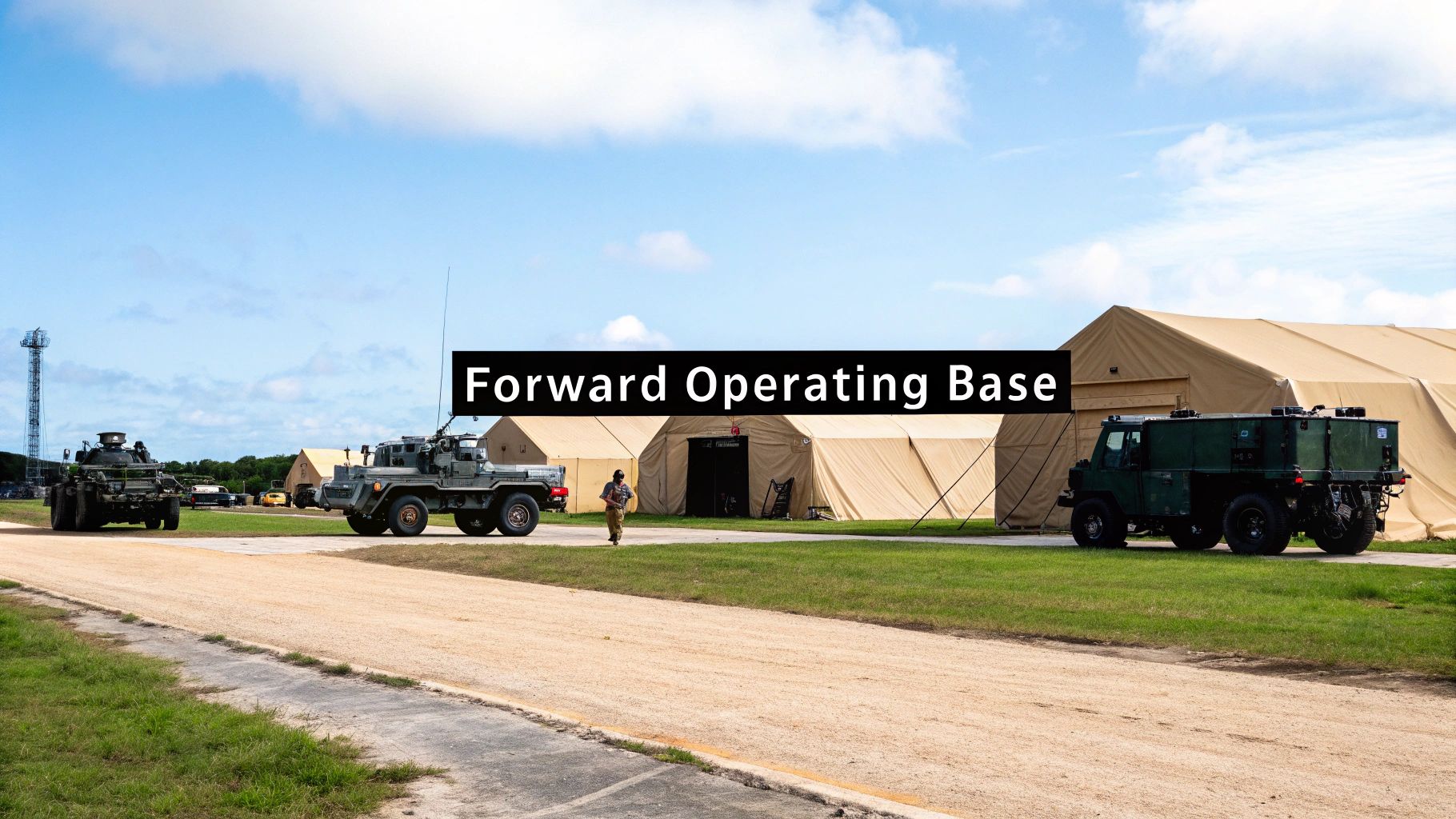What does FOB stand for? Our guide explains FOB shipping terms, who pays for what, and how it impacts your business costs. Get clear answers now.

If you've ever dealt with shipping contracts, you've probably come across the term FOB. It's one of those acronyms that gets thrown around a lot, but what does it actually mean? In simple terms, FOB stands for "Free On Board," and it's a crucial piece of any shipping agreement.
Think of it as the official handover point in a transaction. This single term defines the exact moment the responsibility for a shipment—and all the costs and risks that come with it—passes from the seller to you, the buyer.

FOB is a specific type of Incoterm, which is short for International Commercial Term. These are the globally recognized rules that spell out who is responsible for what during a shipment. Getting the FOB designation right isn't just a tiny detail; it has major financial and legal consequences.
I like to explain it like a relay race. The "baton" is the ownership of the goods, and the FOB point is the pre-agreed spot where that baton is passed. This little term in your contract dictates three critical things:
This concept isn't some newfangled industry jargon. "Free On Board" actually dates back to the age of sail in the 19th century. As global trade exploded, merchants needed a clear way to define the transfer of ownership. Trading powerhouses like London and New York started using FOB to make it clear that the seller's job was done once the goods were safely loaded over the ship's rail. If you're curious, you can read more about the history of these shipping terms to see how these standards evolved.
Here’s the key takeaway: The "Free" in Free On Board means the seller is responsible for getting the goods to a specific point, "free" of any transport cost to the buyer up to that location. After that, it’s on the buyer.
Getting a handle on FOB is your first step toward shipping smarter. It doesn't matter if you're sending a full truckload (FTL) or a smaller less-than-truckload (LTL) shipment—knowing your FOB terms puts you in control of your costs and helps you avoid nasty surprises.
Alright, so you know what FOB means, but the real magic happens when you understand its two main flavors: FOB Origin and FOB Destination. The difference seems small, but it has a huge impact on your costs, risks, and overall control of the shipment.
Think of it as the official “handover” point in a relay race. Who’s holding the baton, and when do they pass it off?
With FOB Origin, the responsibility shifts to you, the buyer, almost immediately. The moment the carrier loads the goods from the seller's location, they’re officially yours.
From that second on, you're the one paying the freight charges and, more importantly, you're the one who has to deal with any problems—like damage or loss—that might happen along the way.
On the flip side, FOB Destination means the seller keeps the baton until the very last second. They are responsible for the goods, the shipping costs, and all the risk until that truck pulls up to your door and the shipment is safely delivered. You don't take ownership until it's on your turf.
Let's make this tangible. Imagine you run a boutique in Chicago and you've just ordered a fresh batch of inventory from a supplier in Los Angeles.
If your contract says FOB Origin: The moment that truck pulls away from the L.A. warehouse, those goods are your problem. You'll be arranging the shipping, paying the carrier, and filing the insurance claim if something goes wrong on the journey to Chicago.
If your contract says FOB Destination: The L.A. supplier is on the hook for everything. They manage and pay for the shipping, and if the goods arrive damaged, it's their responsibility to make it right. You just wait for the delivery.
Choosing the right option is a fundamental part of shipping. For a more detailed walkthrough, you can explore our guide on how to ship freight for your business.
This chart really helps visualize where FOB sits among the various shipping terms, or Incoterms, that define a seller's obligations.

As you can tell, FOB is a solid middle-of-the-road option. The seller has more to do than with a term like EXW (Ex Works), but far less than with something like CIF (Cost, Insurance, and Freight).

Alright, so we've talked about when the responsibility for the goods transfers. But there's another crucial piece to this puzzle: Who actually cuts the check to the freight company? This is where an FOB agreement gets a bit more detailed, and overlooking this part is a classic way to get hit with unexpected bills that can really eat into your profits.
The two big terms you absolutely need to know are Freight Collect and Freight Prepaid. Mastering these is fundamental to keeping your shipping budget in check, whether you're sending a full truckload or just a few pallets.
Let's break it down simply.
Think of Freight Collect like this: the bill is "collected" from the person receiving the goods. The buyer (or consignee) is the one who has to pay the carrier directly, usually when the shipment arrives or shortly after. This setup often goes hand-in-hand with FOB Origin, where the buyer takes charge of the shipment early on.
On the other side, we have Freight Prepaid. This means the seller has already settled the bill with the freight carrier. As the buyer, you won't get a separate invoice from the trucking company because it's already been handled. This is the standard for FOB Destination agreements, where the seller manages everything until it reaches your door.
A Quick Heads-Up: You might also run into a hybrid called "Freight Prepaid & Add." Here, the seller pays the carrier up front to get the goods moving but then adds that exact freight charge to your final invoice. It’s essentially a pass-through cost.
Knowing the difference between these terms gives you a real advantage when negotiating. If you agree to FOB Origin, Freight Collect, you gain the power to select your own carrier, shop around for better rates, and control your shipping costs more directly.
To make this crystal clear, let's look at how these payment terms line up with the main FOB agreements. This table lays out who pays and who owns the goods while they're on the road.
Understanding this table is key. It helps you quickly see the financial and logistical responsibilities tied to each type of agreement, so you can choose the one that best fits your business strategy.
Don't mistake your FOB choice for just another line item on a shipping document. It's a genuine strategic decision that ripples through your entire business, touching everything from your balance sheet and inventory counts to your overall risk profile. It's about more than just who pays for shipping; it’s about who holds the reins.
For example, if you're a buyer and you choose FOB Origin, those goods are legally yours the second they’re on the truck. You can immediately log them as inventory, which directly impacts your financial statements and how you track your assets. Getting this right is fundamental for clean bookkeeping and even for securing business loans.
Flip the coin, and you'll see how sellers can use FOB Destination as a powerful sales perk. By taking care of all the shipping hassles right up to the customer's doorstep, they make buying from them incredibly easy. This can be a huge selling point for customers who would rather not get tangled up in logistics.
One of the most crucial areas your FOB choice influences is insurance. The terms spell out exactly who is on the hook for filing a claim if something goes wrong—a detail that can save you a world of frustration and financial pain.
Key Insight: With FOB Origin, the buyer owns the goods while they're in transit, so they're responsible for filing any insurance claims. Under FOB Destination, that responsibility stays with the seller until the goods are safely delivered.
Grasping this difference is a big step toward keeping your costs in check. For more tips, check out our guide on how to reduce freight costs with smarter shipping strategies.
The sheer popularity of these terms shows just how vital they are. FOB is one of the most widely used Incoterms on the planet, especially for bulk goods. In fact, around 80% of international shipping contracts for things like machinery and farm exports rely on FOB or FOB-origin terms. They’re so common that they shape about 65% of North American imports by volume, particularly in industries like automotive and heavy equipment. You can find more insights on FOB's impact on Ecabrella.com.

The FOB term on your bill of lading does a lot more than just decide who pays for shipping. It has a real, tangible impact on your company's finances and legal responsibilities. It’s one thing to know what FOB stands for, but truly understanding how it plays out on your tax forms is where the real money is saved—or lost.
Think of it this way: the FOB point is where the law says the "sale" officially happens. This isn't just shipping jargon. It's the detail that determines which city or state gets to apply its sales tax, a critical piece of the puzzle for anyone moving goods across state lines.
The difference between FOB Origin and FOB Destination can completely change your tax situation. When you agree to FOB Origin, the sale is typically finalized the moment the freight leaves the seller's dock. That means the seller's local tax rules could apply.
On the other hand, with FOB Destination, the sale isn't complete until the goods are safely at your door. This often means your local tax laws come into play.
Just how big of a deal is this in the U.S.? It's huge. Roughly 70% of states calculate sales tax based on the delivery location (FOB Destination), while the other 30% or so base it on where the shipment started (FOB Origin). This single shipping term affects how over $1 trillion in sales are taxed every year.
This is exactly why your shipping strategy needs to be in sync with your financial planning. Choosing the wrong term isn't just a minor slip-up; it can lead to compliance problems, unexpected tax bills, and major headaches during an audit.
Navigating these complexities is often where an expert can make a world of difference. To see how professionals handle these details, you can learn more about the definition of a freight broker and the role they play. Taking a moment to get your FOB terms straight from the start is one of the smartest things you can do for your business.
As you start navigating the world of shipping, you're bound to have questions about terms like FOB. It's completely normal. Let's break down some of the most common ones we hear, clearing up the confusion so you can ship with confidence.
You've probably heard people say "Freight On Board," and it's an easy mistake to make. However, the officially recognized term in international trade is "Free On Board."
That little word "Free" is actually the most important part. It means the seller's responsibility is to get the goods to the designated shipping point "free" of any cost to the buyer for that initial part of the trip. So while "Freight On Board" is a common mix-up, "Free On Board" is the term that will hold up in any legal contract.
Absolutely. While FOB has its roots in old-school sea shipping, it’s now widely used for ground transport across North America. You'll see it all the time in contracts for both LTL (less-than-truckload) and FTL (full-truckload) freight.
It's good to know, though, that for international shipments that don't travel by sea, other Incoterms are technically a better fit. For instance, FCA (Free Carrier) is often the more precise term. But for domestic shipping here on the ground? FOB is still king.
This is the big one, isn't it? The truth is, there's no single "best" answer—it all comes down to what makes the most sense for your business and your bargaining power.
Think about what you value most. If you want total control over the shipping process, have great relationships with freight carriers, and are confident you can find better rates, FOB Origin is your go-to. On the other hand, if you’d rather have the seller handle all the logistics and simply have the goods show up at your location, FOB Destination offers that peace of mind.
Whether you're shipping FTL or LTL, getting an instant quote can help you compare costs and make the right decision for your business.